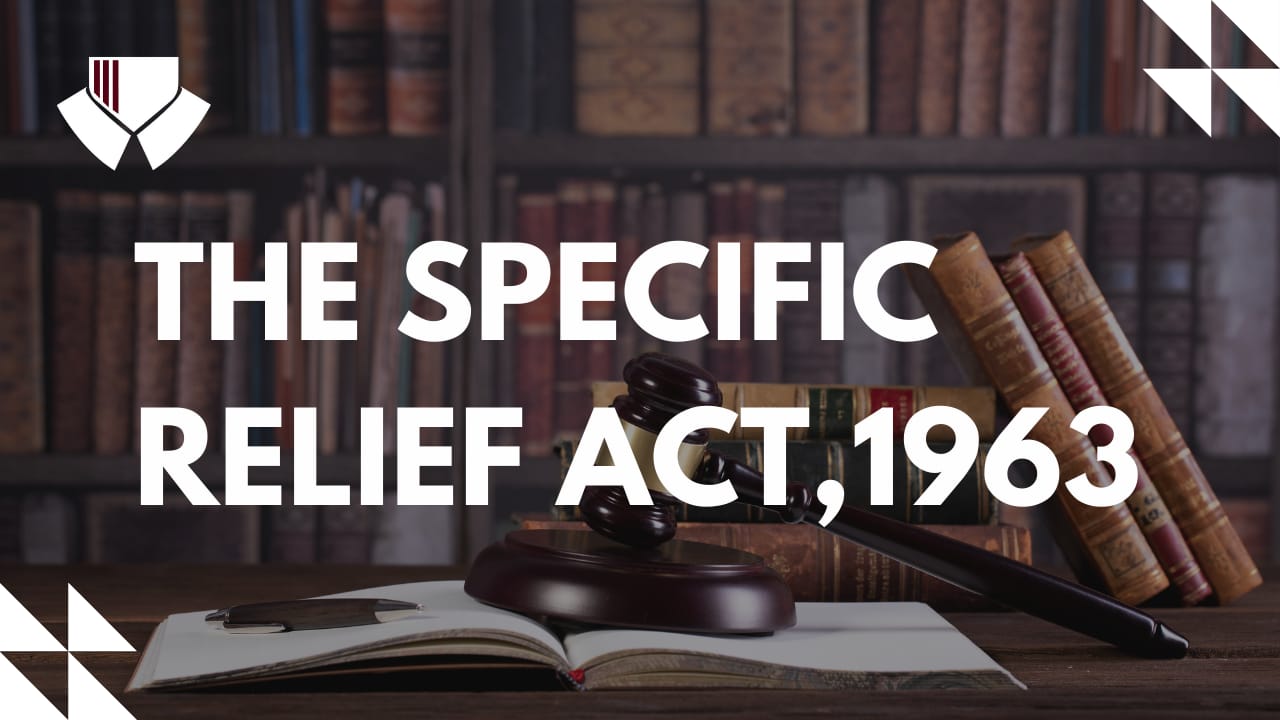This blog is written by Sagili Bhavana Shree, a 2nd year student at Damodaram Sanjivayya National University.
INTRODUCTION
The Specific Relief Act is a legal statute that deals with the remedy or recovery of an injured person’s damages. This Act was adopted in 1963 on the basis that when a person withdraws from the fulfilment of a specific promise or contract with respect to another person, the other person is entitled to relief under the Specific Relief Act, 1963. No one’s property shall be taken away without due process of law. The provisions of the constitution are supplemented with legal instruments that assist citizens in enforcing their rights. For example, if a person is required by contract to undertake a specific act, he or she must not neglect to do so. In the event of a breach, the opposite party may sue for contract performance.
LEGISLATIVE BACKGROUND
The Specific Relief Act, of 1887, which was the first codification of the Law of Specific Relief in India. The Law Commission gave consideration to this legislation’s provisions in its Ninth Report, which resulted in the passage of the Specific Relief Act (Act 47 of 1963) in place of the original legislation. The Commission’s Ninth Report identified significant factors contributing to the situation at the time, and the new legislation it advocated was limited to seven types of particular remedies, including:
(1) Regaining control of property
(2) Performing contracts specifically
(3) Rectifying Instruments
(4) Rescinding Contracts
(5) Cancelling Instruments
(6) Declaratory decrees; and
(7) Injunction.
Different forms of compensatory remedy and specific forms of relief that are mentioned in specific laws are exempt from the 1963 Act.
OBJECT AND NEED OF THE ACT
Specific relief refers to a remedy that asks for the precise performance of an obligation. The older Specific Relief Act of 1877 was replaced on December 13, 1963, by the Specific Relief Act of 1963. This Act’s real goal is to give specific remedies to parties seeking to uphold their civil rights or stop a civil wrong from occurring. A breach of duty constitutes civil harm. Specific remedy is one kind of legal recourse. This is a fair answer.
The Law Commission’s recommendation made in its Ninth Report on the Specific Relief Act of 1877 is attempted to be adopted by this Bill, with the exception of Section 42, which is left in its existing form. When the Lok Sabha was dissolved in 1960, a preceding bill on the subject that had been submitted on December 23 fell by the wayside. The changes made to the existing Act are made clear by the comments on sections taken from the Law Commission Report.
The scope of the Specific Relief Act is restricted to the forms of relief that a court of justice aims to grant the plaintiff in a lawsuit. Bentham’s idea that “the law ought to assure me everything which is mine, without forcing me to accept equivalents, though I have no particular objection to them is put into reality through the Law of Specific Relief.“
EXTENT OF APPLICATION OF ACT
Specific relief will be granted solely for enforcing individual civil rights, not for implementing criminal legislation. —Specific remedy can only be provided to enforce individual civil rights, not to enforce a penal law. The statute of limitations for a suit for particular performance is three years from the day of performance or, if no date is set, when the plaintiff receives notice that performance is refused. Article 54 of the Limitation Act specifies a three-year limitation period for a claim for specific performance of a sale agreement of immovable property.
PROVISIONS AND SALIENT FEATURES OF THE ACT
| S.NO | IMPORTANT PROVISIONS | EXPLANATION |
| SPECIFIC PERFORMANCE(Sections :- 10 – 25 ) | The court orders a party to perform a specific act according to the terms of the contract . | |
| INJUNCTIONS (Sections:- 36-44) | The court orders restraining a party from performing a particular act. | |
| RECTIFICATION OF INSTRUMENTS(Sections:- 26-35) | The Provisions allows for the correction of contracts, deeds or other instruments in case of mistakes. | |
| RECESSION OF CONTRACTS(Sections :- 27,30) | Cancellation of Contracts under certain conditions. | |
| CANCELLATION OF INSTRUMENTS(Sections:- 31-33) | Cancellation of written Instruments obtained by fraud, coercion or misrepresentation. | |
| RECOVERY OF POSSESSION OF IMMOVABLE PROPERTY(Sections:- 5-7) | Specifies conditions for the recovery of possession of immovable property. | |
| COMPENSATION IN LIEU OF SPECIFIC PERFORMANCE(Sections:- 20) | Allows for monetary compensation instead of specific performance in certain cases. |
CRITICISM
- The Specific relief act, 1963 was not amended since its inception, many developments were taken place during this period like technology, e-commerce, AI, and other developments, but there are no corresponding changes in the Act.
- Contracts based on Infrastructure development, public-private partners, and other public projects involving huge investments cannot be dealt with properly through the Act, which needs more clarification and better enactments for ease of business.
- The procedure prescribed under the Act is time-consuming and lengthy, which increases the litigation costs
- The monetary remedies given in the act are not adequate to satisfy the victim as the compensatory amounts were according to at the time of enactment, particular remedies are discretionary to the judge, where the judges can be biased.
CONCLUSION
The Specific Relief Act of 1963 provides a series of reliefs to the parties. They have various reliefs and enforce rules that are aimed at delivering adequate compensation to all. The major goal of this legal statute is that no one should have to live with the damages and losses, and those who have caused such a scenario must be able to repay any unlawful benefits acquired by them. This statute focuses on ensuring justice to all rather than unfairly favouring one group. This Act is considered to be a branch of the Indian Contracts Act of 1872. The Specific Relief Act 1963 went into force on December 13, 1963. Its primary goal is to provide relief to parties who have suffered civil wrongs. Civil harm is a violation of a duty for which courts can grant particular relief. Courts can grant specific relief as a remedy. However, there are certain limitations to the act which need to amended according to the contemporary situation.


